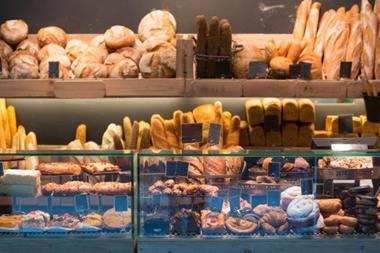In part six of our series aimed at new or expanding bakery businesses, we tackle the topic of choosing and maintaining equipment
There’s a dreamy, far-away look some people get when referring to the love of their life. That’s what happens to bakers when they talk about a favourite oven. Or a prover that has changed their lives.
But love doesn’t always run smooth and, for an entrepreneur making their first equipment purchases, there are many elements to consider.
“Someone new to the trade should definitely seek advice from an experienced baker,” says Lee Smith of Bexhill Farm Kitchen.
Mark Sheath of Jengers Bakery says his 30 years in the baking industry – and the experience of his team – has been a big help in choosing equipment. Sheath purchased an existing, fully equipped bakery, but the equipment had not been regularly serviced as the owners were retiring.
“Once in the business, we identified potential issues and had the old equipment fully serviced, which highlighted our needs going forwards,” he explains. “We worked with what we had and have slowly replaced the equipment as and when required.”
This included replacing two gas provers with electric ones, and buying a second-hand dough divider from Brook Food Processing Equipment when the business grew to such a size that hand-scaling loaves was no longer practical.
In its first few years the business also purchased a second-hand spiral mixer to replace an old mixer that was not up to the work required, and a second-hand retarder prover to help with production and efficiency. “We use downtime to make morning goods and doughnuts and set the timer to come on and prove ready to fry the doughnuts the next day,” says Sheath.
The first site bought by Martin Hunt of Joe’s Bakery in Bristol was a small back-street Victorian bakery with very little equipment, and what equipment was there was very old – including a steam tube oven built in 1905.
“I had to think about re-equipping from the start,” he says. And, not being a baker by trade, he had a lot to learn, and quickly.
“I started going to the local Bristol Master Bakers meetings, went to every bakery auction in the area – whether I needed equipment or not – and befriended a few local bakers. I also started subscribing to British Baker, which was very informative.”
This gave him an understanding of the availability and price of second-hand bakery equipment, and he found that most bakery owners were friendly and happy to help him.
“From this newly acquired knowledge I was able to start re-equipping the bakery with small and affordable pieces, generally second-hand but new if I could afford it.”
Equipment supplier Reiser will typically visit a customer to get an understanding of their business, what they want to make, and their desired throughput in terms of speed and capacity requirements.
“Our preference is to work with our customers as a partnership from the beginning to the end of a project,” explains Reiser UK & Ireland bakery sales manager James Fitch. “This way expectations on requirements such as size and cost are aligned much earlier in the process. It’s important to understand the production process from start to finish to identify any bottlenecks and to be sure we are offering the current solution to the customer needs.”
When it comes to financing, Reiser says it is usually more cost-effective to purchase equipment rather than hire it – a view echoed by Hunt of Joe’s Bakery.
“I tend to put larger pieces of equipment on hire purchase (HP) and pay outright for smaller pieces,” he adds. “This is a fairly straightforward decision now that we are established, but appreciate that for newly established or fast-growing businesses the cash flow considerations are vital.”
As for the question of buying new versus second-hand, Hunt says he prefers to buy ovens new and put these on HP. “Ovens are the core of the bakery and will last a very long time, so I think it is worth investing in new. Some of our larger equipment, such as bread plant, was bought second-hand, but refurbished by a local bakery engineer and has served us very well.”
He will consider second-hand for smaller pieces of equipment – such as tables and bread moulders – and buy them outright.
As for maintenance, many small bakeries will carry out basic work themselves while turning to local engineering firms for their other needs.
“We are lucky as we have three such firms locally, but we tend to stick to just the one and also buy quite a bit of equipment from them so that they have an ongoing interest in giving us a good service,” says Hunt.
Sheath bought a second-hand deck oven from a local supplier and engineer of bakery equipment and, 30 years later, still uses the same firm for much of his equipment.
Sheath considers himself “extremely lucky” to have a local retired bakery engineer in the village. He has set up a rolling maintenance programme to identify the needs of all its equipment, and also has a maintenance contract for all refrigeration kit.
“Regular servicing is a must, you simply cannot have breakdowns in the middle of the night and have to call your customers to say there won’t be any bread today. It’s not acceptable,” adds Sheath.
Smith at Bexhill Farm Kitchen also uses a local engineer to maintain his equipment.
Reiser also says regular servicing and preventive maintenance is essential, but finds it is often overlooked.
“The importance of training on-site engineering personnel also cannot be underestimated,” adds Fitch. “We offer on-or off-site training dependent on the customer requirements and have a field service team who will service equipment in the field as required.”
Hunt adds that, in the case of larger pieces of new equipment, it will use the main agent to carry out maintenance for a few years at least.
“Having said that, I tend to use equipment suppliers that are not too far away from us, as I begrudge paying hundreds of pounds in ‘travel time and mileage’ for an engineer to do, for example, a 30-minute job.”
He adds he will sometimes get equipment refurbished to maintain its working life. “Refurbishment can cost as much as buying second-hand, but I feel that I then know the equipment is back to ‘good as new’, whereas second-hand can look pristine but not actually be in very good condition,” he adds.
Smith says the usual reason he has for replacing equipment is because of the need for something bigger – although he recently had to change a mixer because one fell off a table.
Another reason for investing in new kit is rising wage costs – and concerns about recruitment – with businesses buying new equipment to boost productivity.
This is why Joe’s Bakery recently bought a large walk-in freezer and two new deck ovens, and currently has a refurbished four-pocket roll plant on order. “This investment level will almost certainly continue for a few more years,” he says, adding that he tends not to go for the latest technology. “I don’t think it’s worth the risk; better to let someone else test it out first.”
Of course, there is risk with any purchase, and Smith says he made two new purchases that didn’t work properly, one of which was an oven that was eventually changed for a different one by the manufacturer.
In the case of a troublesome prover, the company Smith bought it from tried to solve the many problems he had with it. Ultimately, when they refused to change it, he got them to take it away and bought another prover from a different company.
Like any relationship, getting the right equipment needs consideration, hard work and, possibly, advice from a third party. But no-one said true love would be easy.
From the must-haves to the desirables... all the kit you need
Ann Wells, group marketing director at Brook Food Processing Equipment, offers advice on the essential starting kit for a new bakery business producing a small range of goods
We see new-start and expanding businesses week after week, looking for this advice, and it’s a pleasure to work alongside bakers at this formative stage and beyond as the businesses grow.
In its most basic form, all a bakery really needs in terms of main equipment – the stuff with a plug on – is an oven and a mixer. These are the two pieces of equipment you really can’t do without.
A deck oven is the norm for this kind of bakery, whether retail or wholesale, as they can effectively bake various products well.
A spiral mixer is most essential for bread and, if the budget allows, then an additional planetary style mixer for pastry, fillings and cake would be recommended.
With the rise in artisan bread production many more bakers at this scale opt for long fermentation methods, although most sites still have a prover of some sort for some of the product range, so a basic, manual-fill cupboard-style prover is next on the list.
After that it starts to get luxurious, and labour-saving.
Rolling out pastry is hard work, so if producing morning goods, sweet pastries or pies and tarts, then a pastry sheeter – also known as a brake or roller – is a lifesaver. They speed up pastry production as well as reduce aching limbs and can be used for other products if the business needs, such as sugarpaste and some biscuit doughs.
After these basic pieces of kit, the rest that can be added will be additional labour-and time-savers, such as semi-automatic moulders, retarders etc, but these aren’t all essential on day one, and especially not if there is a tight budget.
Other things to consider when setting up are all the sundries needed to work alongside the kit – the baskets, the trays, the tins and the tools. These can be pricey, so research what’s needed for fermentation, baking, storage etc.
Always consider getting the kit into the site as early as possible. Invest time and effort in finding a site with good access with a door wide enough to get the oven in.
It’s not 100% essential as some equipment can be dismantled, but the hassle and cost implications are worth bearing in mind.
Likewise, ensure you have enough electrical power coming into the building for the equipment you’re considering. Most machines are fairly low in terms of kW rating, but the oven will be the biggest pull and it is expensive to upgrade supplies if they aren’t sufficient, something you wouldn’t want to do in a rented building.
Powering up: making sense of energy
Having the right kit for your bakery is one thing – another important consideration is paying for the juice that will make it run.
A good place to start is to assess your business needs, advises the Federation of Small Businesses (FSB), while considering areas such as finances, how you will mainly use the energy provided, how often you need access to sufficient power, and whether your company has an environmentally friendly focus.
When finding the most suitable tariff and contract, think about energy prices, how often they fluctuate, and how flexible your contract needs to be. Also, understand what different supplier tariffs include.
“You might also want to choose a supplier tariff that combines your gas and electricity payments, offering a dual package, rather than being charged for them separately,” says the FSB. “Deals like this could save you money on your bills in the long run.”
Energy contract types vary from supplier to supplier and can include:
Fixed term – you pay a set price until the end of a fixed term, such as 12 months. This provides protection against rising prices, but you may have to pay a fee if you leave before the contract ends.
Pass through contracts – the price you pay can vary as non-commodity prices rise and fall. This contract is usually only available to larger SMEs.
When entering a contract, it’s important to be wary of roll-on contracts, according to the FSB, as these automatically renew, regardless of changes in energy prices.
Mark Sheath at Jengers Bakery agrees it is important to look around the marketplace for a provider. “Take independent advice, especially if you are baking at night as we do,” he says.
One option is using a specialist energy broker or third-party intermediary, rather than dealing directly with energy providers, which can save costs.
Martin Hunt of Bristol-based Joe’s Bakery warns that he had a bad experience when an intermediary went bankrupt.
“The power supplier tried to make us pay about £30,000 that we knew we didn’t owe,” he says. “We stood our ground and won our case, but it has made me wary ever since. Having said that, we do now use an intermediary; but only because I have known the agent since our school days and trust him to do a good job.”
Recent years have also brought the rise of independent energy suppliers. Lee Smith at Bexhill Farm Kitchen says using one of these for his electricity supply has saved his business a lot of money.
Further information on sourcing an energy supplier is available at fsb.org.uk.
Showing their mettle: tins and trays
Beyond the big pieces of kit, other essential equipment for a bakery operation are racks and trays suitable for the particular goods a business will be producing.
Popular options include aluminium baking sheets and perforated French stick, bloomer and Vienna trays, according to supplier Invicta Group, which adds that one of its best-sellers is its cup trays range (pictured) with a patented tray-locking system. A selection of bread tins, as single units or in straps, is also useful.
Invicta also advises that a heavy-duty stainless steel preparation table is a good investment, as is a selection of quality, plastic ingredients tubs, containers, mixing bowls and sieves, plus plastic bakery trays for finished products.
“It’s worth investing in quality equipment,” says Invicta Group business development manager Lee Croucher. “Not only will it perform better – thereby improving product quality and cutting down on wastage – but it will also have a longer lifespan, which ultimately saves money.”
Some bakers purchase second-hand tins and trays, but Croucher suggests buyers should be wary. “The main factors that need to be considered are the general condition of the equipment on offer and what additional money needs to be spent to bring it up to standard, for instance cleaning, repair or recoating,” he says.
Meanwhile, Bundy Baking Solutions says bakers should ensure they are not washing pans with harsh chemicals or using automatic dishwashers if not recommended by the manufacturer.
“When a pan starts to become excessively dirty or loses its non-stick properties, operators start using parchment papers or more oil to ensure proper release of baked goods,” says Jason Bowman, Bundy vice president – Europe. “However, this can be expensive and, in the case of oil, change the overall product formula or cause even more carbon build-up.”
Bundy offers a service that cleans the pans, removes carbon build-up and any remaining coating and then recoats the pan. The company can also straighten warped or damaged pans.
“In essence, businesses are getting almost new pans at a fraction of the cost,” says Bowman.
Never gonna give you up
We asked bakers what piece of equipment (excluding core kit such as ovens, fridges and mixers), they could never part with. Discover what they find essential below:
“One of the first pieces of new equipment we purchased was a spray gun for spraying greasing emulsion onto the tins. Greasing is a horribly dirty job and, years ago, the baker would use an old grease cloth. A grease gun is a wonderful piece of equipment every bakery should have.” Mark Sheath, Jengers Bakery
“I would never give up my hydraulic 16-piece divider and my 22-piece bun divider moulder.” Lee Smith, Bexhill Farm Kitchen
“The Mono ‘L’ sealer I bought new 30 years ago and has been in daily use ever since. It is an extremely reliable and flexible piece of equipment and sealing soft rolls and tray-cakes keeps them so much better.” Martin Hunt, Joe’s Bakery





























No comments yet